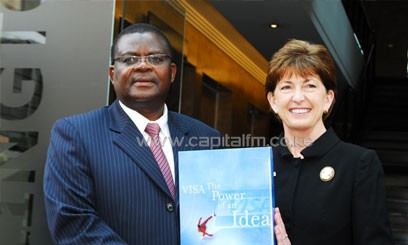
Nearly half of Kenya’s population lives on less than $2 (Sh171) a day and approximately 11 million do not have access to financial services, especially youth and those living in rural areas/FILE
According to the Financial Access Initiative, a research centre focused on exploring how access to financial services improves the lives of poor households, over 80 percent of the adult population in Sub-Saharan Africa remains financially illiterate, as compared to only eight percent in high income countries.
Nearly half of Kenya’s population lives on less than $2 (Sh171) a day and approximately 11 million do not have access to financial services, especially youth and those living in rural areas. Visa has launched the website Africamoneyskills.com to provide useful knowledge on money management and economic growth to consumers and businesses in a move to boost financial literacy throughout Africa.
Relations Manager for Visa in Sub-Saharan Africa Kate Kelly said they are dedicated to helping consumers, families, educators and students of all ages learn the essentials of personal finance through the website.
“We offer a diverse range of resources; including money management tools and resources and educational games for classroom use,” she said.
“Our goal is to empower educators, enable student learning and help provide people of all ages with the tools necessary for financial success,” she added.
The majority of youth in Kenya are engaged in the informal economy and need financial services as well as business training to improve their livelihoods.
Additionally, women below the poverty line face particular challenges with regards to accessing employment, finance and technical skills to run enterprises.
“We plan to help change that; Financial Literacy provides the foundation for access to financial services. Africamoneyskills.com is a valuable addition to our range of financial literacy initiatives targeted at the educational needs of people in Africa,” Kelly said.
The lack of accessible and effective banking, coupled with predominantly cash based societies in much of the developing world has hampered the individual’s ability to chart a path out of poverty.
Only an estimated 30 percent of start-ups in Kenya survive beyond the third year, yet Small and Medium Enterprise’s (SMEs) provide over 70 percent employment in the formal economy.
Low levels of financial literacy have also prevented SMEs from adequately assessing and understanding different financing options, and from navigating complex loan application procedures.
According to The Global Financial Literacy Barometer 2012, a collaborative research programme undertaken by Visa and Kiplinger’s Personal Finance Magazine, more than 68 percent of survey respondents have less than three months’ worth of emergency reserves on hand to fund basic needs in the event of an unexpected financial event like job loss.
“The Global Financial Literacy Barometer clearly demonstrates that, while there have been great strides made in advancing financial education, there is still much more to be done,” Kelly observed, reiterating Visa’s commitment to helping people of all ages gain the financial tools necessary to become better money managers for improved quality of life.
She explained that Visa stands with consumers as an ally in personal money management with a goal of financial inclusion for all and they have run popular and entertaining road shows in Africa, bringing financial literacy to people in the communities where they live.
“We’ve brought live financial literacy education programmes to about 200,000 people. Now we also offer it online,” she added.
Building on Visa’s tradition of providing financial literacy in a friendly and accessible format, the website contains a broad range of information in easy-to-understand language.
Kelly revealed that it also offers advice for real-life scenarios, such as how to save to buy a home or how to steer clear of debt.
“Visa’s guiding principle is to provide economic empowerment by providing people with the tools, such as Africamoneyskills.com, to make wise financial decisions,” she said.
The site carries content suitable for all demographics including downloadable curriculum material for school teachers who wish to incorporate financial literacy into their lesson plans.
The lesson plans are ready to use, complete with notes for teachers and educational content.
Also available on the site is the Visa Financial Football, a free computer game, which will encourage financial education by making it fun and entertaining by combining the world’s most popular sport with financial education topics such as saving, budgeting, setting financial goals and what to do in the event of losing a bank card.


































